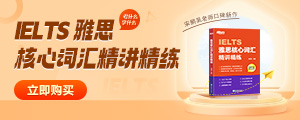
雅思免费课程NEW
剑桥题库机考HOT
雅思水平测试NEW
雅思选课中心
雅思听力
雅思口语
雅思阅读
雅思写作
雅思问答
雅思考试机经回忆
雅思动态NEW
雅思备考指导
雅思模拟题
雅思核心词汇NEW

雅思备考规划
扫码添加助教免费咨询雅思备考规划

扫码关注回复雅思获取最新雅思口语题库和备考资料
以下是新东方在线雅思网给大家分享的雅思阅读资料:The Triumph of Unreason。希望对大家的雅思备考有所帮助,更多雅思备考资料欢迎大家随时关注新东方在线雅思网。
Part I
Reading Passage 1
You should spend about 20 minutes on Questions 1-13 which are based on Reading Passage1 below.
The Triumph of Unreason?
A.
Neoclassical economics is built on the assumption that humans are rational beings who have a clear idea of their best interests and strive to extract maximum benefit (or “utility”, in economist-speak) from any situation. Neoclassical economics assumes that the process of decision-making is rational. But that contradicts growing evidence that decision-making draws on the emotions—even when reason is clearly involved.
B.
The role of emotions in decisions makes perfect sense. For situations met frequently in the past, such as obtaining food and mates, and confronting or fleeing from threats, the neural mechanisms required to weigh up the pros and cons will have been honed by evolution to produce an optimal outcome. Since emotion is the mechanism by which animals are prodded towards such outcomes, evolutionary and economic theory predict the same practical consequences for utility in these cases. But does this still apply when the ancestral machinery has to respond to the stimuli of urban modernity?
C.
One of the people who thinks that it does not is George Loewenstein, an economist at Carnegie Mellon University, in Pittsburgh. In particular, he suspects that modern shopping has subverted the decision-making machinery in a way that encourages people to run up debt. To prove the point he has teamed up with two psychologists, Brian Knutson of Stanford University and Drazen Prelec of the Massachusetts Institute of Technology, to look at what happens in the brain when it is deciding what to buy.
D.
In a study, the three researchers asked 26 volunteers to decide whether to buy a series of products such as a box of chocolates or a DVD of the television show that were flashed on a computer screen one after another. In each round of the task, the researchers first presented the product and then its price, with each step lasting four seconds. In the final stage, which also lasted four seconds, they asked the volunteers to make up their minds. While the volunteers were taking part in the experiment, the researchers scanned their brains using a technique called functional magnetic resonance imaging (fMRI). This measures blood flow and oxygen consumption in the brain, as an indication of its activity.
E.
The researchers found that different parts of the brain were involved at different stages of the test. The nucleus accumbens was the most active part when a product was being displayed. Moreover, the level of its activity correlated with the reported desirability of the product in question.
F.
When the price appeared, however, fMRI reported more activity in other parts of the brain. Excessively high prices increased activity in the insular cortex, a brain region linked to expectations of pain, monetary loss and the viewing of upsetting pictures. The researchers also found greater activity in this region of the brain when the subject decided not to purchase an item.
G.
Price information activated the medial prefrontal cortex, too. This part of the brain is involved in rational calculation. In the experiment its activity seemed to correlate with a volunteer's reaction to both product and price, rather than to price alone. Thus, the sense of a good bargain evoked higher activity levels in the medial prefrontal cortex, and this often preceded a decision to buy.
H.
People's shopping behaviour therefore seems to have piggy-backed on old neural circuits evolved for anticipation of reward and the avoidance of hazards. What Dr Loewenstein found interesting was the separation of the assessment of the product (which seems to be associated with the nucleus accumbens) from the assessment of its price (associated with the insular cortex), even though the two are then synthesised in the prefrontal cortex. His hypothesis is that rather than weighing the present good against future alternatives, as orthodox economics suggests happens, people actually balance the immediate pleasure of the prospective possession of a product with the immediate pain of paying for it.
I.
That makes perfect sense as an evolved mechanism for trading. If one useful object is being traded for another (hard cash in modern time), the future utility of what is being given up is embedded in the object being traded. Emotion is as capable of assigning such a value as reason. Buying on credit, though, may be different. The abstract nature of credit cards, coupled with the deferment of payment that they promise, may modulate the “con” side of the calculation in favour of the “pro”.
J.
Whether it actually does so will be the subject of further experiments that the three researchers are now designing. These will test whether people with distinctly different spending behaviour, such as miserliness and extravagance, experience different amounts of pain in response to prices. They will also assess whether, in the same individuals, buying with credit cards eases the pain compared with paying by cash. If they find that it does, then credit cards may have to join the list of things such as fatty and sugary foods, and recreational drugs, that subvert human instincts in ways that seem pleasurable at the time but can have a long and malign aftertaste.
本文关键字: 雅思阅读

 资料下载
资料下载
雅思写作高频词汇PDF下载
发布时间:2023-08-26添加新东方在线雅思助教号
回复【200】获取
590组雅思阅读写作必背短语PDF版下载
发布时间:2023-08-09添加新东方在线雅思助教号
回复【590】获取
雅思学术词汇搭配表PDF版下载
发布时间:2023-08-04添加新东方在线雅思助教号
回复【ACL】获取
雅思口语part3结构策略PDF版下载
发布时间:2023-08-04添加新东方在线雅思助教号
回复【Part3】获取
雅思听力高频场景词PDF版下载
发布时间:2023-08-09添加新东方在线雅思助教号
回复【高频词】获取
雅思口语Part2答案示范15篇PDF下载
发布时间:2023-07-26添加新东方在线雅思助教号
回复【P2】获取
雅思小作文35组必备表达PDF下载
发布时间:2023-07-26添加新东方在线雅思助教号
回复【35】获取
雅思阅读高频短语PDF下载
发布时间:2023-07-20添加新东方在线雅思助教号
回复【短语】获取
200组雅思写作高频词汇PDF下载
发布时间:2023-07-20添加新东方在线雅思助教号
回复【200】获取
雅思写作话题词汇PDF下载
发布时间:2023-07-16添加新东方在线雅思助教号
回复【话题】获取
50组雅思口语同义替换词PDF下载
发布时间:2023-07-10添加新东方在线雅思助教号
回复【替换】获取
雅思写作大作文精选题目101PDF下载
发布时间:2023-07-09添加新东方在线雅思助教号
回复【101】获取
雅思口语核心300词PDF下载
发布时间:2023-06-23添加新东方在线雅思助教号
回复【300】获取
雅思阅读分类词汇PDF下载
发布时间:2023-06-17添加新东方在线雅思助教号
回复【分类词】获取
雅思口语必备习语PDF下载
发布时间:2023-06-17添加新东方在线雅思助教号
回复【习语】获取
雅思小作文常用词汇66词PDF下载
发布时间:2023-06-16添加新东方在线雅思助教号
回复【66】获取
雅思口语常见功能结构109句PDF下载
发布时间:2023-06-08添加新东方在线雅思助教号
回复【109】获取
10年雅思写作题库PDF下载
发布时间:2023-06-08添加新东方在线雅思助教号
回复【写作话题】获取
雅思图表作文精选套句50句PDF下载
发布时间:2023-05-28添加新东方在线雅思助教号
回复【50】获取
雅思写作99组高频词汇PDF资料
发布时间:2023-05-28添加新东方在线雅思助教号
回复【99】获取
2023年5月雅思口语新题题库PDF版本
发布时间:2023-05-14添加新东方在线雅思助教号
回复【新题】获取
2023年5-8月雅思口语新题题库与解析PDF版本
发布时间:2023-05-06关注新东方在线考雅课程中心服务号
回复【新题】获取
雅思听力考点词汇PDF资料
发布时间:2023-04-27添加新东方在线雅思助教号
回复【考点词】获取
雅思听力机经词汇PDF资料
发布时间:2023-04-24添加新东方在线雅思助教号
回复【TL】获取
雅思口语Part1常见话题语料库PDF资料
发布时间:2023-04-20添加新东方在线雅思助教号
回复【Part1】获取
剑桥雅思阅读长难句50句PDF资料
发布时间:2023-04-19添加新东方在线雅思助教号
回复【长难句】获取
雅思阅读核心学术词汇表PDF资料
发布时间:2023-04-07关注新东方在线考雅课程中心服务号
回复【核心】获取
100个雅思写作观点词和替换词表达PDF资料
发布时间:2023-03-24关注新东方在线考雅课程中心服务号
回复【100】获取
雅思阅读分类词汇PDF资料
发布时间:2023-03-22关注新东方在线考雅课程中心服务号
回复【分类词】获取
雅思阅读短语PDF资料
发布时间:2023-03-08关注新东方在线考雅课程中心服务号
回复【短语】获取

添加新东方在线雅思助教,
回复【口语】获取雅思口语资料大礼包

 推荐阅读
推荐阅读
在雅思阅读备考中,考生可以提前准备一些在考试场中可能会用到的应试技巧。接下来小编为大家分享雅思阅读临场经验和应试技巧,希望能为
来源 : 网络 2021-01-06 14:53:27 关键字 : 雅思阅读
在雅思阅读备考中,考生想要快速的取得进步,那么就需要结合一定的方法和技巧,往正确的方向努力。接下来小编为大家带来的是雅思阅读准
来源 : 网络 2021-01-06 14:52:33 关键字 : 雅思阅读
在雅思阅读备考中,填空题属于经典题型,但是这类题型也有一定难度,很多考生在这类题型上容易丢失分数。接下来小编给大家带来的是雅思
来源 : 网络 2021-01-05 14:32:45 关键字 : 雅思阅读
在雅思阅读考试中,考生可以通过一些实战技巧,帮助我们在考试中有一个更好的发挥。接下来小编为大家分享雅思阅读考试高分实战技巧,希
来源 : 网络 2021-01-05 14:31:40 关键字 : 雅思阅读
雅思阅读考试对考生来说有一定难度,很多考生在时间上出现问题,导致答不完题,时间不够用,其实这些情况我们都是可以改善的,那么如何
来源 : 网络 2021-01-04 15:09:13 关键字 : 雅思阅读





 资料下载
资料下载
添加新东方在线雅思助教号
回复【200】获取
添加新东方在线雅思助教号
回复【590】获取
添加新东方在线雅思助教号
回复【ACL】获取
添加新东方在线雅思助教号
回复【Part3】获取
添加新东方在线雅思助教号
回复【高频词】获取
添加新东方在线雅思助教号
回复【P2】获取
添加新东方在线雅思助教号
回复【35】获取
添加新东方在线雅思助教号
回复【短语】获取
添加新东方在线雅思助教号
回复【200】获取
添加新东方在线雅思助教号
回复【话题】获取
添加新东方在线雅思助教号
回复【替换】获取
添加新东方在线雅思助教号
回复【101】获取
添加新东方在线雅思助教号
回复【300】获取
添加新东方在线雅思助教号
回复【分类词】获取
添加新东方在线雅思助教号
回复【习语】获取
添加新东方在线雅思助教号
回复【66】获取
添加新东方在线雅思助教号
回复【109】获取
添加新东方在线雅思助教号
回复【写作话题】获取
添加新东方在线雅思助教号
回复【50】获取
添加新东方在线雅思助教号
回复【99】获取
添加新东方在线雅思助教号
回复【新题】获取
关注新东方在线考雅课程中心服务号
回复【新题】获取
添加新东方在线雅思助教号
回复【考点词】获取
添加新东方在线雅思助教号
回复【TL】获取
添加新东方在线雅思助教号
回复【Part1】获取
添加新东方在线雅思助教号
回复【长难句】获取
关注新东方在线考雅课程中心服务号
回复【核心】获取
关注新东方在线考雅课程中心服务号
回复【100】获取
关注新东方在线考雅课程中心服务号
回复【分类词】获取
关注新东方在线考雅课程中心服务号
回复【短语】获取

 编辑推荐
编辑推荐
 雅思新题
雅思新题
 阅读排行榜
阅读排行榜
 相关内容
相关内容